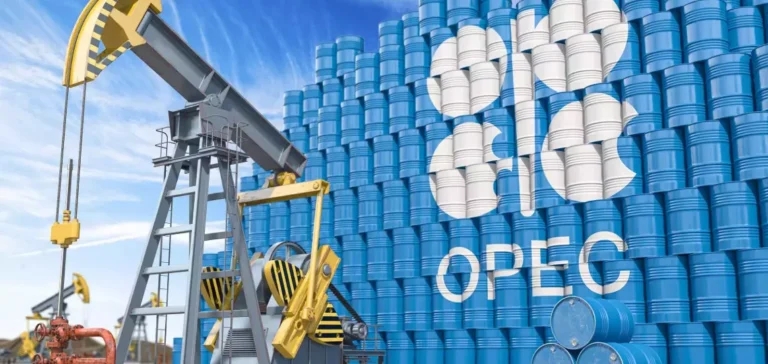The Organization of Petroleum Exporting Countries (OPEC) has left unchanged its forecasts for global oil demand growth in 2025 and 2026, anticipating an annual increase of about 1.3 million barrels per day (mb/d). Global demand is therefore projected at 105.13 mb/d in 2025 and 106.42 mb/d for the following year, according to data published in its latest monthly report. These figures, previously discussed in earlier assessments, indicate relative stability despite recurring adjustments in global oil supply. Conversely, the organization slightly lowered its production growth forecast for non-OPEC+ countries to 0.7 mb/d in 2026, compared to the previous 0.8 mb/d.
OPEC+ production below quotas in May
The combined production of OPEC+ member countries, excluding Libya, Iran, and Venezuela, reached 35.729 mb/d in May 2025, placing it 52,000 barrels per day (b/d) below the established quotas after accounting for voluntary cuts and compensations planned. Despite an overall increase of 200,000 b/d compared to the previous month, significant disparities persist. Kazakhstan continued to substantially exceed its obligations, producing 433,000 b/d above its assigned quota by the alliance. Conversely, certain members reduced output or failed to meet assigned targets, influencing the group’s overall result.
Mixed performances from quota-exempt countries
Among countries exempt from OPEC+ quotas, Libya increased its production by 36,000 b/d, reaching 1.302 mb/d in May. Iran, conversely, saw production decline by 25,000 b/d to 3.303 mb/d. Venezuela experienced an even more pronounced decline, with output falling by 32,000 b/d to 896,000 b/d during the same period. These fluctuations among quota-exempt countries are closely monitored by oil markets, as these volumes significantly impact global supply and demand balances.
Russia struggles to meet its targets
Russian oil production rose slightly by 3,000 b/d in May, reaching 8.984 mb/d, yet remained 14,000 b/d below quotas set by OPEC+. This situation partly results from compensation commitments related to previous periods of overproduction. For the second consecutive month, Russia failed to fully meet its OPEC+ obligations, registering a production shortfall of 17,000 b/d in April against its quotas. This reality underscores the technical and operational difficulties some OPEC+ members continue to face in precisely aligning their production with agreed levels.
The continuation of these gaps between assigned quotas and actual production levels prompts the market to closely monitor upcoming adjustments and strategic decisions by OPEC+. Industry participants will carefully observe whether affected countries can sustainably meet these objectives, a critical factor for global oil market stability and forecasting.






















